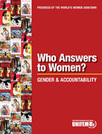Sort by: Author | Title | Publication Year
BOOKS
Culture, Development, and Public Administration in AfricaOgwo Jombo Umeh and Greg Andranovich Using southern African nations as an example, the authors argue that emerging societies are poor today thanks to the over reliance on non-local models. Practitioners must consider local cultures—-languages, symbols, customs, and rituals—in developing effective administrative practices. They must absorb the experiences of people who know first-hand the dynamics and conditions in these More > |  |
Elusive Reform: Democracy and the Rule of Law in Latin AmericaMark Ungar Elusive Reform explores one of the Latin American countries' biggest challenges: establishing a rule of law. Based on a close examination of historical patterns, it demonstrates how executive power and judicial disarray thwart progress toward judicial independence, state accountability, and citizen access to effective means of conflict resolution.
Ungar critiques the wide spectrum of agencies More > |  |
Thai Politics: Between Democracy and Its DiscontentsDaniel H. Unger and Chandra Mahakanjana The prospects for Thailand's emergence as a democracy seemed strong in the 1990s. Yet, as most recently demonstrated by military coups in 2006 and 2014, that hasn't happened. Why not? Why have factors typically considered advantageous for democratization turned into barriers? Is there a uniquely Thai reason that democratization efforts have failed?
More > |  |
Progress of the World’s Women 2008/2009: Who Answers to Women? Gender and AccountabilityUNIFEM Progress of the World’s Women 2008/2009 presents new data providing clear evidence that women's empowerment and gender equality are key drivers for reducing poverty, building food security, reducing maternal mortality, safeguarding the environment, and enhancing the effectiveness of aid.
More > |  |
Progress of the World’s Women 2002: Volume 2, Gender Equality and the Millennium Development GoalsUnited Nations Development Fund for Women Tackling the challenges of tracking and determining progress for women relative to the commitments made in the Millennium Development Goals of 2000, this report outlines goals, targets, and indicators using comparative data; charts female literacy, enrollment in education, wage employment, seats in government, and infection with HIV/AIDS; and highlights innovations in measuring and monitoring More > |  |
Confronting Power: The Practice of Policy AdvocacyJeff Unsicker A grassroots citizens' group in Peru stops a multinational firm from digging a mine in the middle of town. The research director of a think tank in Ghana helps convince the government to establish a national AIDS commission. An international NGO plays a key role in getting funding for climate-change adaptation included in a bill passed by the US Congress. All three are cases of the More > |  |
Reasons for Success: Learning from Instructive Experiences in Rural DevelopmentNorman Uphoff, Milton J. Esman, and Anirudh Krishna From an outside perspective that contrasts the personal, firsthand views of the first text, Reasons for Hope, the authors impart critical, dynamic ideas for improving the lives of those in rural communities. They contend that real progress depends less on money alone, and more upon passionate ideas, acting on those ideas through leadership, and implementing appropriate methods for change. More > |  |
Cyber Intelligence: Actors, Policies, and PracticesConstance S. Uthoff US national security compromised by Wikileaks. Towns held hostage by ransomware. Corporate websites hacked. Cyber espionage and cybercrimes are increasing in both frequency and sophistication—requiring the collection of actionable intelligence in order to combat them. Constance Uthoff provides a comprehensive overview of cyber intelligence, explaining what it is, why it is needed, who is More > |  |
Islamist Economics in Egypt: The Pious Road to DevelopmentBjørn Olav Utvik Islamism is often portrayed as a reaction against, or at best a belated accommodation to, modernization. Refuting this dismissive opinion, Bjørn Utvik explores the movement through the lens of its engagement with social and economic change in Egypt.
Utvik provides a comprehensive picture of debates within mainstream Islamist groups that are grappling with concrete economic issues. More > |  |
Aiding Violence: The Development Enterprise in RwandaPeter Uvin Winner of the African Studies Association’s Herskovits Award!
Aiding Violence expresses outrage at the contradiction of genocide in a country considered at the time by Western aid agencies to be a model of development. Peter Uvin reveals how aid enterprises reacted—or failed to react—to the 1990s dynamics of militarization and polarization in Rwanda that resulted in mass More > |  |



